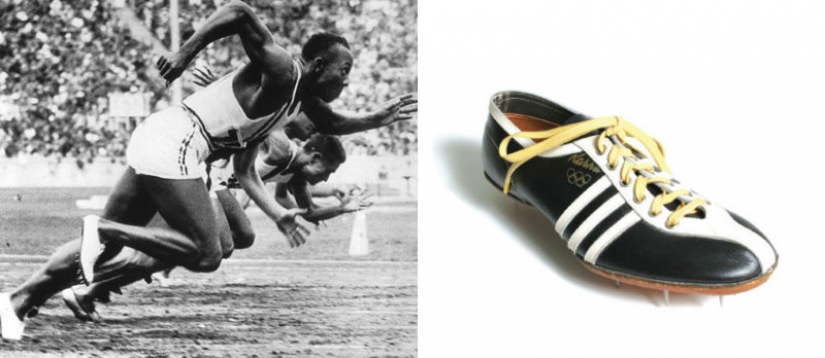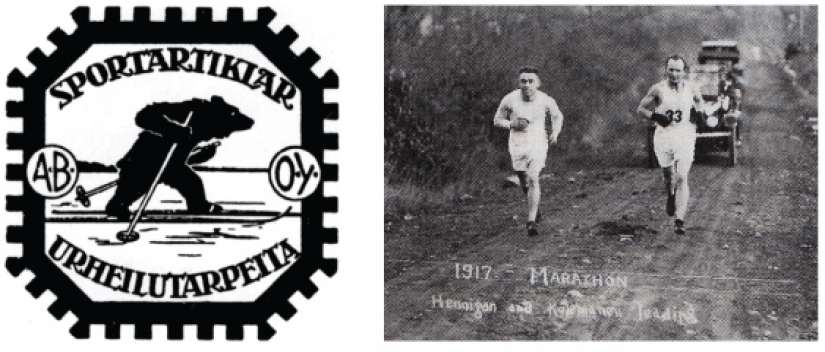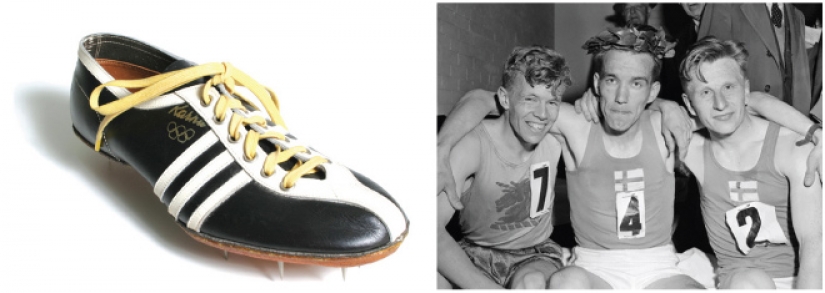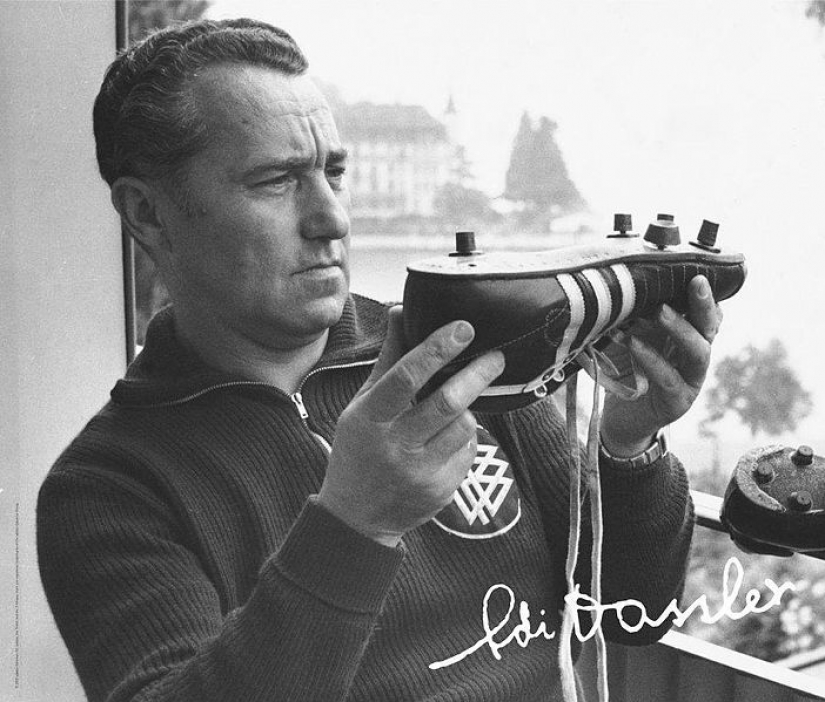1600 euros and two bottles of whiskey: how adidas bought the rights to three stripes
In 1916, in Helsinki, there was a small workshop under the guise of Sportartiklar Oy Ab. They sold skis, ski poles and other winter gear, made of Finnish birch. It's light weight and flexibility give athletes the advantage in tournaments — first in Finland and then abroad. In 1917, the Finnish skier Hannes Kolehmainen won with this outfit competitions in the United States.

 The demand for goods Sportartiklar Oy Ab grew rapidly. In the 1920s, the brand changed its name to the more understandable Karhu. In Finnish it means "bear" (the first company logo was drawn by a large brown bear on skis).
The demand for goods Sportartiklar Oy Ab grew rapidly. In the 1920s, the brand changed its name to the more understandable Karhu. In Finnish it means "bear" (the first company logo was drawn by a large brown bear on skis).
Soon Karhu became the official outfitter of Finland at the Olympics. Finnish runner Paavo Nurmi won the Karhu nine gold medals at the Games in 1920 in Antwerp and the Olympics 1924 in Paris. Moreover, at the Olympic games 1932 in Los Angeles two gold medals took workers Karhu — Matti järvinen (javelin) and Lauri Lehtinen (5000 meters). The company then was a special system of encouragement of employees for training during the lunch break.
During the Second world war Karhu produced camouflage uniforms, tents, army boots, rucksacks and skis for the Finnish army.
 1952-became for Karhu topping. The Finns dominated the Olympic games in Helsinki (15 gold medals), the Karhu brand was becoming more known around the world. Looked their shoes like that (see photo above) — remind you of anything?
1952-became for Karhu topping. The Finns dominated the Olympic games in Helsinki (15 gold medals), the Karhu brand was becoming more known around the world. Looked their shoes like that (see photo above) — remind you of anything?
And soon they came out of ADI Dassler.
The problem was that, even if someone won something in the shoes of adidas, no one knew. The shoes of Dassler was not a distinctive visual traits from the podium or as even experts could not understand, adidas athletic or not.
Once Dassler came to the factory to see unfinished samples of shoes. Then came up the side leather strips that are inserted into my boot to secure the foot. To paint them was made in the same way as the rest of the sneakers. But that day Dassler saw athletes in the unfinished shoes. Stripes on their shoes were white and noticeable. Dassler realized that this is what you need. Now his shoes will be visible from afar.
 ADI decided that the ideal number of bands to three. But the design with the three stripes has already used Karhu. After the extremely successful Finnish Olympic games-1952 Dassler called representatives Karhu sports fair in Frankfurt. There, he offered to sell the rights to the use of three leather stripes. The Finns agreed for a ridiculous compensation — two bottles of whiskey and the equivalent of 1600 euros.History is like a fiction, but written about it in the official blog of Karhu, and in the famous book about adidas and Puma called Pitch Invasion (citing historian Karhu). So Dassler has forever solved the problem with the identification of products adidas.
ADI decided that the ideal number of bands to three. But the design with the three stripes has already used Karhu. After the extremely successful Finnish Olympic games-1952 Dassler called representatives Karhu sports fair in Frankfurt. There, he offered to sell the rights to the use of three leather stripes. The Finns agreed for a ridiculous compensation — two bottles of whiskey and the equivalent of 1600 euros.History is like a fiction, but written about it in the official blog of Karhu, and in the famous book about adidas and Puma called Pitch Invasion (citing historian Karhu). So Dassler has forever solved the problem with the identification of products adidas.
 Brand Karhu is still alive. It is not as influential as in the first half of the twentieth century, but the Finns still do sneakers.
Brand Karhu is still alive. It is not as influential as in the first half of the twentieth century, but the Finns still do sneakers.
 Yes, Finnish Olympians do not tear the whole world in gear Karhu. But in their sneakers Kanye goes — so, not so bad, even after possibly the worst deals of all time.
Yes, Finnish Olympians do not tear the whole world in gear Karhu. But in their sneakers Kanye goes — so, not so bad, even after possibly the worst deals of all time.
Keywords: Adidas | Brand | Shoes | Buy | Sell
Post News ArticleRecent articles

It's high time to admit that this whole hipster idea has gone too far. The concept has become so popular that even restaurants have ...

There is a perception that people only use 10% of their brain potential. But the heroes of our review, apparently, found a way to ...
Related articles

No one will argue with the fact that Russia — unique country, where it can happen that it is impossible in any other country. ...

Bottled water is in great demand all over the world. Its sales are growing by an average of 10% per year and by the next 2020, the ...

Time not only changes the appearance and habits of the people, but also force us to drastically change some things. To them ...

New Year's is a time to surprise and delight loved ones not only with gifts but also with a unique presentation of the holiday ...